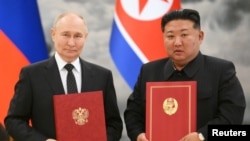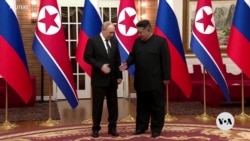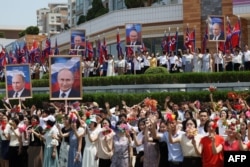North Korea and Russia have signed a treaty containing a mutual defense clause, Russian President Vladimir Putin and North Korean leader Kim Jong Un announced Wednesday, during a rare Putin visit to Pyongyang.
Following a day of highly publicized events, Putin and Kim signed a “comprehensive strategic partnership agreement,” formally upgrading relations that have expanded since Russia’s 2022 invasion of Ukraine.
The text of the agreement has not been released. But following the signing, Putin said the deal contains a clause that “provides for the provision of mutual assistance in the event of aggression against one of the parties.”
The move amounts to a significant change of Russian policy toward North Korea, potentially restoring a mutual defense treaty that had been abolished following the collapse of the Soviet Union.
Following the signing ceremony, Kim said the relationship has been elevated to the level of an "alliance," although Putin did not use that phrase in his public comments.
According to a Kremlin readout, Putin noted that Russia “does not rule out the possibility that its cooperation with the DPRK in defense and technology will be developed further,” using an acronym for North Korea’s official name.
The development is sure to rattle Western leaders, who have condemned Russian-North Korean cooperation as a violation of international law. U.S. officials accuse North Korea of supplying Russia with thousands of containers of munitions, including ballistic missiles, for use on the Ukraine battlefield.
The treaty signing surprised many observers, who had predicted that any formalization of the relationship would fall short of a formal alliance.
“Kim Jong Un has been able to extract more concessions than we thought he would be able to from his support for Russia’s invasion of Ukraine,” said Ramon Pacheco Pardo, a Korea specialist and professor of international relations at King's College London.
The move appears to be an attempt to reanimate Soviet-era relations between Moscow and Pyongyang, although not all analysts are convinced that ties have reached that level.
“Clearly, it’s an important development, but I think we will need to see this relationship continue on a strong footing for a number of years before we can say there has been a definite change in the relationship,” said Pacheco Pardo.
Close, but how close?
In recent years, Russia and North Korea have projected a unified stance as each country’s relations with the West deteriorated. But the partnership has faced significant strains.
As recently as 2017, Russia supported United Nations Security Council resolutions in response to North Korea's illicit nuclear weapons program. Russia now opposes those sanctions, with Putin on Wednesday calling them part of a “confrontational U.S. policy.”
Treaty relations between Moscow and Pyongyang also have been turbulent.
In 1961, North Korea and the Soviet Union signed a friendship and mutual assistance treaty that included a provision for military intervention in emergencies. That deal was abolished after the Soviet Union's collapse.
The two countries signed a new treaty in 2000, but it focused on economic rather than military matters. Russian officials say the latest document will replace that pact.
Kim Gunn, a South Korean lawmaker who earlier this year stepped down as South Korea’s top nuclear envoy, condemned the signing of the mutual defense clause, which he said is “only harmful to the peace and stability of the Korean Peninsula.”
But in Kim’s estimation, the move is aimed at establishing the appearance of an alliance rather than the real thing. “Don't be dismayed by the facade of the visit, because that's exactly what they intend to achieve,” he told VOA.
Details matter
Analysts will closely parse the language of any new treaty signed by Putin and Kim – if the agreement text is released.
In addition to North Korea, Russia also shares comprehensive strategic partnerships — its highest form of interstate relations — with countries that include Vietnam, Mongolia and some Central Asian nations. However, not all those relationships are described as alliances.
“Language matters for these things, in terms of what specific commitments and obligations are made,” said Mason Richey, associate professor at South Korea's Hankuk University of Foreign Studies. “Mutual assistance in case of attack would qualify as an alliance.”
But Richey said he has “serious questions” about the ostensible alliance between Russia and North Korea, “especially as post-Cold War Russia has a spotty record in supporting its strategic partners.”
“North Korea would do well to examine the experience of Armenia in its last war with Azerbaijan. Russia was not very helpful to its supposed ally,” Richey said.
Asked by VOA what he thinks of the North Korean-Russian treaty development, former Russian diplomat Georgy Toloraya said the agreement “means what it says … nuclear umbrellas.”
But, he added, “Security guarantees do not equal alliance.”
Late arrival
The treaty signing Wednesday capped a busy day for Putin, who arrived at the Pyongyang airport around 3 a.m. — several hours later than Russian officials had earlier anticipated.
Despite the late hour, Kim greeted Putin with a hug while standing on a red carpet rolled out next to Putin’s plane.
The Russian leader later received a grandiose welcoming ceremony in Pyongyang’s central Kim Il Sung Square, where buildings were draped in massive Russian and North Korean flags and portraits of the two leaders.
North Korean residents waved bright flower bouquets as Putin and Kim observed an honor guard before departing for negotiations.
At the outset of the talks, Putin thanked North Korea for its “consistent and unwavering support” for Russian policy, including in Ukraine, reported Russia’s Interfax news agency.
Kim expressed his “full support and solidarity” for what he called Russia’s “special military operation” in Ukraine, and he vowed to “unconditionally support” Russia’s policies, according to Russian media.
Late Wednesday, Putin presented Kim with a luxury, Russian-built Aurus limousine — the second such vehicle that Putin has given to Kim in recent months.
According to Russian television, Putin got behind the wheel, taking Kim for a ride around the grounds of the Kumsusan Palace — a national landmark that contains the embalmed bodies of Kim’s father and grandfather.
Putin was expected to depart late Wednesday for Hanoi, the second stop on his foreign tour.









